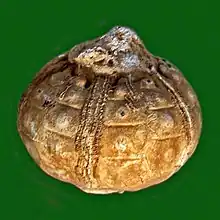| Diplocidaris Temporal range: [1] | |
|---|---|
 | |
| Fossil inner cast of Diplocidaris gigantea, on display at Galerie de paléontologie et d'anatomie comparée in Paris | |
| Scientific classification | |
| Domain: | Eukaryota |
| Kingdom: | Animalia |
| Phylum: | Echinodermata |
| Class: | Echinoidea |
| Order: | Cidaroida |
| Family: | †Diplocidaridae |
| Genus: | †Diplocidaris Desor, 1855 |
Diplocidaris is an extinct genus of sea urchins belonging to the family Diplocidaridae. The type species of this genus is Cidaris gigantea Agassiz, 1840.[2]
These slow-moving low-level epifaunal grazer-omnivores [1] lived in the Jurassic period, from 161.2 to 150.8 Ma.[1] Fossils of this genus have been found in the sediments of Europe, North Africa, Madagascar.[2]
Species
- Diplocidaris gigantea (Agassiz, 1840)
- Diplocidaris besairiei Lambert, 1936
- Diplocidaris jacquemonti Lambert, 1910
- Diplocidaris desori Wright, 1858
- Diplocidaris dumortieri Cotteau, 1863
- Diplocidaris gevreyi Lambert in Savin 1902
- Diplocidaris bernasconii Bischof, Hostettler & Menkveld-Gfeller, 2018[3]
References
- 1 2 3 The Paleobiology Database
- 1 2 3 Natural History Museum
- ↑ Eva A. Bischof; Bernhard Hostettler; Ursula Menkveld-Gfeller (2018). "The cidaroids from the Middle Oxfordian St-Ursanne Formation of the Swiss Jura Mountains". Revue de Paléobiologie, Genève. 37 (1): 1–27.
This article is issued from Wikipedia. The text is licensed under Creative Commons - Attribution - Sharealike. Additional terms may apply for the media files.